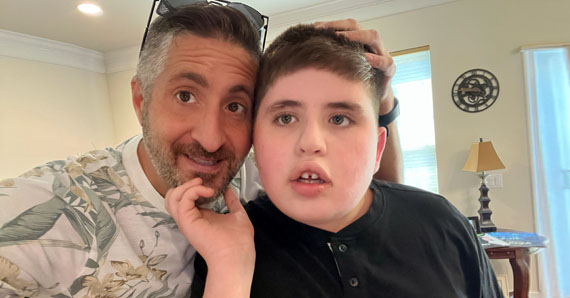I spend a lot of time trying to explain to people how raising a non-verbal child with autism is quite similar to raising a verbal child who isn’t on the spectrum. This is because, for the world at large, the differences are glaring. It’s the similarities that need to be spotlighted.
After all, kids are kids. Lucas has the same desires as another boy his age. He wants his TV shows, snacks, and fun activities. Dragging him away for schooling or a boring family outing is met with resistance. Those without a special needs child can understand that. It feels like common sense. That’s just how kids are.
So, I’ll share stories about that. I’ll talk about a time he tried to sneak his way into the kitchen for extra cookies or some other anecdote from our time together. People read. People smile. People say, “Oh, that’s just like my kid.” Join hands. Kumbaya.
For the most part, that is all true. We have common bonds that stretch among all parents. Whether it’s the naughtiness, vulnerability, or loving moments, our kids are our kids. I’ve seen common threads between my son and his older sister, who doesn’t have autism. So I get it. The goal of my writing has always been to make sure others get it too. Autism Acceptance, in my eyes, begins by demonstrating that autism doesn’t make him a different species. It just colors his personality in ways that other children might not.
It doesn’t, however, erase the fact that some things about raising a non-verbal child are different. Some things are very different.
As his father, I’m reminded of this, often out of nowhere. When he was young, it would knock me for a loop because, as other children were emerging into a world of language, I wasn’t around to see it. All I saw was my son. In my head and in my home, Lucas was the only four, five, of however-old kid we knew. He was the only boy in our world.
Then someone would come by and ask:
SO, HOW DOES HE LIKE SCHOOL? DOES HE LIKE HIS TEACHER?
Explosions would go off in my head. I hadn’t even thought about that. Is that a thing? Are these people’s kids telling them they like school? They must be. They’re talking. Oh my God, I have no idea. How do I not know? I hadn’t even thought about it.
Sure, I get notes in a book from the teachers themselves. They tell me if he had “a good day” or if he required “some assistance transitioning.” I’d get reports, far more often than I ever did for my daughter. I took that as a good thing. Wait…is that because she could tell me these things herself and he can’t? Oh no. How did I miss that?
These teachers could say whatever they want. They could give me glowing reports but spend the day forcing these kids to manufacture handbags for Martha Stewart. Images flash through my head of Lucas in a corner, struggling with a sewing machine as an irate shop steward screams at him while holding a pitbull on a leash inches from his face. My stomach drops.
I am the worst father in the world. How could I go about my day and not even know if he likes school? This is terrible. This is awful. This is…
ARE YOU OK? I ASKED IF HE LIKED SCHOOL.
Then I’d realize I had been staring into space for 30 seconds. There’s some random friend of a friend or distant relative searching my face for visual clues as to whether or not I’ve just had an aneurysm. I clear my throat.
Oh. Sorry. Long day. Yeah. Loves it.
I have no idea if he loves it.
Questions like this were on the same level of a four-year-old telling me a knock-knock joke while my boy was still far off from verbalizing anything. It’s a shocking moment that tells you that the path you’re on might be in a different zip code from the ones other families are on…even if we began at the same starting line.
Well, here we are, years later. I have had all this time to get used to having a non-verbal son with autism. He is twelve now and we have learned to communicate so many things in so many ways. So, when you ask me if he likes school today, I can honestly say that, well, school for him is…uh…
Um.
Yeah.
Sorry. Long day.
Truth? I still don’t really know. I do, however, have instincts and intuition. That’s what I go on.
The issue with intuition and visceral reactions is that, with my son, it works best in terms of immediate issues. If he’s hungry or tired in that moment, observations help and his communication device can tell me bluntly. The same can be said with unhappiness or anger. Right then and there, I understand him. I can sense his wants.
Once school is over, though, it’s over. It’s hard to ascertain if how he’s acting now has anything to do with how he feels about anything that happened then. I simply can’t know for sure anything about how he feels regarding the people, places, or events of the previous day. It doesn’t matter if it’s school or any place where he’s out of my sight. If I’m not there, as it happens, I don’t know.
What I’ve learned is that it’s about smaller clues and cues based on his behavior. Reactions that other parents might write off, like being apprehensive about entering a building, have to be taken more seriously. I can’t simply shrug and go, “No kid likes school. Of course, he wants to go home.”
No. Not with Lucas. In the absence of words, his actions count three times higher than they might for another child. The smallest negative response has to be magnified and examined until I find out its reason. It doesn’t matter how annoying I have to be or how many people might think I am overreacting. I owe it to him. This is my son. This is my life.
No, he can’t tell me certain things. But he can let me know through other ways. I just need to listen to things that aren’t said. If I can be observant and vigilant, I won’t steer him wrong. But as his dad, I spend every day worried that I might. It’s part of the job description and, no matter how much effort it takes, I’ll do it for him until I’m no longer here.









